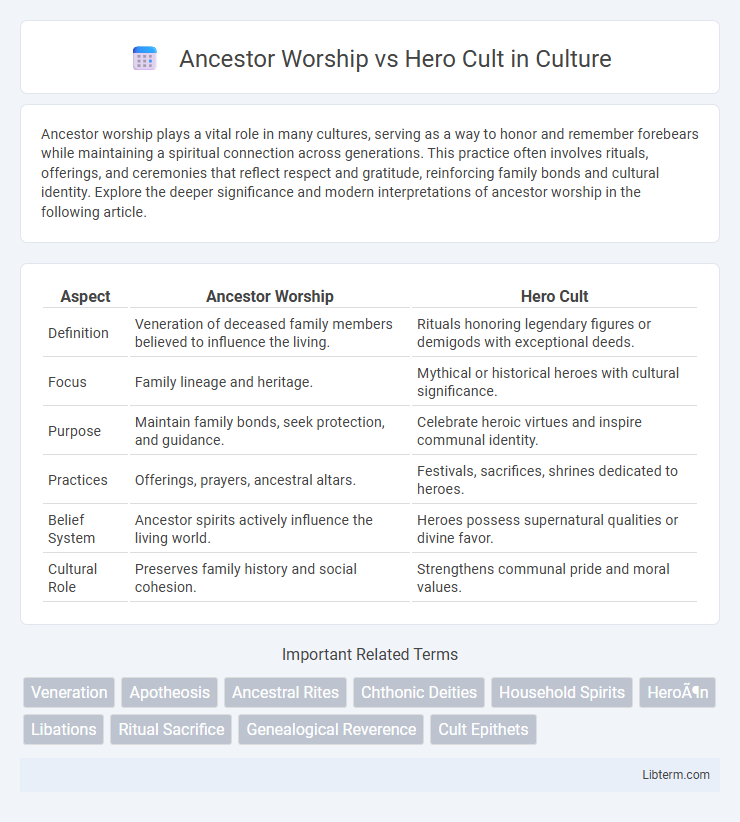Ancestor worship plays a vital role in many cultures, serving as a way to honor and remember forebears while maintaining a spiritual connection across generations. This practice often involves rituals, offerings, and ceremonies that reflect respect and gratitude, reinforcing family bonds and cultural identity. Explore the deeper significance and modern interpretations of ancestor worship in the following article.
Table of Comparison
| Aspect | Ancestor Worship | Hero Cult |
|---|---|---|
| Definition | Veneration of deceased family members believed to influence the living. | Rituals honoring legendary figures or demigods with exceptional deeds. |
| Focus | Family lineage and heritage. | Mythical or historical heroes with cultural significance. |
| Purpose | Maintain family bonds, seek protection, and guidance. | Celebrate heroic virtues and inspire communal identity. |
| Practices | Offerings, prayers, ancestral altars. | Festivals, sacrifices, shrines dedicated to heroes. |
| Belief System | Ancestor spirits actively influence the living world. | Heroes possess supernatural qualities or divine favor. |
| Cultural Role | Preserves family history and social cohesion. | Strengthens communal pride and moral values. |
Defining Ancestor Worship and Hero Cult
Ancestor worship involves venerating deceased family members believed to influence the living's fortune and well-being through rituals and offerings. Hero cults honor legendary figures or demigods, celebrating their extraordinary deeds and often establishing temples or shrines to perpetuate their legacy. Both practices reflect cultural values but differ in focus: ancestor worship centers on familial lineage, while hero cults emphasize mythic or historical heroism.
Historical Origins and Development
Ancestor worship originated in early agrarian societies, where veneration of deceased family members reinforced social cohesion and lineage continuity, particularly evident in Confucian China and ancient African cultures. Hero cults developed in ancient Greece and Rome as communal religious practices honoring legendary or semi-divine figures, integrating myth, ritual, and civic identity. Both practices evolved to institutionalize memory and identity, with ancestor worship emphasizing familial piety and hero cults focusing on collective heroic virtues and civic ideals.
Core Beliefs and Ritual Practices
Ancestor worship centers on venerating deceased family members through rituals such as offerings, prayers, and commemorative ceremonies to maintain familial bonds and seek guidance, emphasizing the ongoing influence of ancestors in daily life. Hero cults focus on honoring legendary or mythic figures with public rites, sacrifices, and festivals aimed at securing their protection and favor, often linked to community identity and mythological legacy. Both practices involve ritualized respect and communication with the supernatural, but ancestor worship prioritizes lineage continuity, while hero cults emphasize collective memory and communal glory.
Key Differences in Worship Focus
Ancestor worship centers on venerating deceased family members and seeking their guidance or protection, emphasizing familial lineage and continuity. Hero cults focus on legendary or semi-divine figures, celebrating their extraordinary deeds and attributing to them a divine status beyond mere ancestry. The key difference lies in ancestor worship's personal and familial devotion versus hero cults' public and mythic glorification.
Societal Roles and Functions
Ancestor worship reinforces social cohesion by linking living members to a shared lineage, maintaining family honor and continuity through rituals that validate kinship ties. Hero cults function as a focal point for community identity by elevating exceptional individuals whose deeds embody societal values, inspiring collective memory and public veneration. Both practices serve to structure social order: ancestor worship anchors group loyalty in blood relations, while hero cults unify broader communities around exemplary role models.
Symbolism and Iconography
Ancestor worship emphasizes familial continuity through symbols like ancestral tablets, spirit plaques, and effigies that represent lineage and filial piety. Hero cults utilize iconography such as statues, altars, and commemorative reliefs depicting heroic deeds and divine qualities to inspire communal identity and valor. Both practices employ symbolic imagery to reinforce social cohesion, but ancestor worship centers on familial bonds while hero cults celebrate extraordinary individual achievements.
Influence on Art and Architecture
Ancestor worship profoundly influenced East Asian art and architecture, inspiring ancestral tablets, spirit houses, and elaborate tomb designs reflecting filial piety and continuity. Hero cults, prevalent in ancient Greece and Rome, shaped monumental temples, statues, and public spaces dedicated to legendary figures, emphasizing their divine status and heroic narratives. Both traditions contributed to cultural identity by embedding spiritual beliefs into visual and structural forms that commemorate revered figures.
Regional Variations and Examples
Ancestor worship in East Asian cultures, such as China and Korea, emphasizes familial lineage and rituals to honor deceased ancestors, reflecting Confucian values and community continuity. Hero cults in ancient Greece, like those dedicated to Heracles in the Peloponnese, involve veneration of legendary figures with attributes bridging mortality and divinity, often tied to local identities and heroic myths. Regional variations highlight ancestor worship's focus on family and social order in East Asia, contrasting with hero cults' celebration of individual heroic feats and semi-divine status in Mediterranean societies.
Legacy in Modern Religions and Cultures
Ancestor worship emphasizes honoring familial lineage and maintaining spiritual connections across generations, reinforcing social cohesion and identity in many East Asian and African cultures. Hero cults, originating from ancient Greek traditions, celebrate exceptional individuals whose deeds transcend mortality, influencing modern concepts of sainthood and cultural nationalism. Both practices shape contemporary religious rituals and community values by preserving legacy through veneration and mythologized remembrance.
Comparative Impact on Cultural Identity
Ancestor worship deeply roots cultural identity by reinforcing familial lineage and communal values, fostering a continuous connection between past and present generations. Hero cults shape cultural identity through the veneration of legendary figures whose stories embody societal ideals and collective memory. Both practices contribute uniquely to cultural cohesion, with ancestor worship emphasizing genealogical continuity and hero cults promoting shared mythological heritage.
Ancestor Worship Infographic

 libterm.com
libterm.com